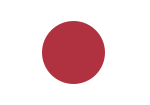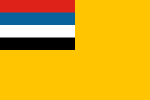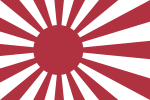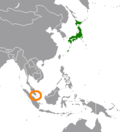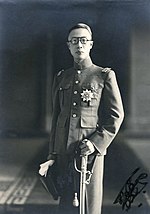Imperial Japanese rations were the field rations issued by Imperial Japan in World War II, and which reflected the culture of the Japanese military. Rations...
5 KB (645 words) - 02:44, 3 September 2024
The Imperial Japanese Army (IJA) was the principal ground force of the Empire of Japan. Forming one of the military branches of the Imperial Japanese Armed...
68 KB (8,060 words) - 14:47, 25 September 2024
Military rations, operational rations, or military provisions are goods issued to sustain the needs of military personnel. As their name suggests, military...
31 KB (3,157 words) - 15:02, 20 September 2024
part of the Shōwa era, under Hirohito's reign. The Imperial Japanese Army (IJA) and the Imperial Japanese Navy (IJN) were responsible for a multitude of war...
298 KB (31,797 words) - 06:30, 31 October 2024
Motojiro was appointed for the commander of Japanese military police forces. Japanese finally replaced Imperial Korean police forces in June 1910, and they...
186 KB (19,465 words) - 21:52, 27 October 2024
Manchukuo (redirect from Imperial Japanese colonialism in Manchukuo)
known as the Japanese repatriation from Huludao. Historians generally consider Manchukuo a puppet state of Imperial Japan due to the Japanese military's...
144 KB (17,014 words) - 02:50, 26 October 2024
Regiment of the British Indian Army who died while fighting against the Imperial Japanese Army in World War II. After Badluram's death, the quartermaster Sub...
10 KB (940 words) - 18:38, 12 September 2024
following Imperial Japan's attack on Pearl Harbor, Guam, the Philippines, and Wake Island in December 1941. Before the war, about 127,000 Japanese Americans...
244 KB (26,893 words) - 02:10, 29 October 2024
Battles of Khalkhin Gol (redirect from Soviet-Japanese War (1939))
future Japanese divisions commonly included specialized Epidemic Prevention and Water Purification Departments. Finally, the Japanese food rations were...
59 KB (6,562 words) - 10:01, 31 October 2024
The Japanese 18th Army (第18軍, Dai-jyūhachi gun) was a field army of the Imperial Japanese Army during World War II. The Japanese 18th Army was formed on...
6 KB (526 words) - 23:12, 25 November 2022
government-issued rations and pay for their achievements. The top performers within this class would get accepted into the Imperial Academy as gongsheng...
176 KB (23,756 words) - 17:55, 17 September 2024
The Japanese occupation of West Sumatra, officially known as Sumatora Nishi Kaigan Shū (Japanese: スマトラ西海岸州, Hepburn: Sumatora Nishikaigan-shū, lit. 'West...
126 KB (15,171 words) - 06:14, 3 November 2024
Special Naval Landing Forces (redirect from Imperial Japanese Marines)
Naval Landing Forces (SNLF; Japanese: 海軍特別陸戦隊, romanized: Kaigun Tokubetsu Rikusentai) were the marines of the Imperial Japanese Navy (IJN) and were a part...
23 KB (2,969 words) - 09:34, 3 November 2024
Prisoners of war captured by Japanese imperial forces were also used as slaves during the same period. The export of a slave from Japan is recorded in the 3rd...
28 KB (3,232 words) - 00:38, 22 October 2024
vital concern to Japanese Imperial General Headquarters, and in particular to the Imperial Navy, which was tasked with protecting Japan's outlying Pacific...
48 KB (5,905 words) - 19:03, 1 October 2024
Ōfuna prisoner-of-war camp (category Articles containing Japanese-language text)
Camp (大船収容所, Ōfuna shūyōsho) was an Imperial Japanese Navy installation located in Kamakura, outside Yokohama, Japan during World War II, where high-value...
9 KB (1,119 words) - 01:13, 3 November 2022
Battle of Imphal (category Articles containing Japanese-language text)
theatre of World War II. The Japanese defeat at Kohima and Imphal was the largest up until that time, with many of the Japanese deaths resulting from starvation...
47 KB (5,967 words) - 06:50, 28 October 2024
German Empire (redirect from Imperial Germany)
The German Empire (German: Deutsches Reich), also referred to as Imperial Germany, the Second Reich or simply Germany, was the period of the German Reich...
151 KB (16,152 words) - 06:19, 28 October 2024
Tōgō Heihachirō (category Imperial Japanese Navy marshal admirals)
the Imperial Japanese Navy and became one of Japan's greatest naval heroes. As Commander-in-Chief of the Combined Fleet during the Russo-Japanese War...
38 KB (4,055 words) - 19:05, 4 November 2024
Nanjing War Crimes Tribunal (category Japanese war crimes in China)
of Chiang Kai-shek to judge Imperial Japanese Army officers accused of crimes committed during the Second Sino-Japanese War. It was one of ten tribunals...
5 KB (558 words) - 07:43, 20 June 2024
Operation U-Go (category Articles containing Japanese-language text)
The U Go offensive, or Operation C (Japanese: ウ号作戦, U Gō sakusen), was the Japanese offensive launched in March 1944 against forces of the British Empire...
20 KB (2,503 words) - 21:05, 3 November 2024
Fall of Singapore (redirect from Japanese invasion of Singapore)
the Japanese but much of the water for the island was drawn from reservoirs on the mainland. The British destroyed the causeway, forcing the Japanese into...
94 KB (11,717 words) - 10:26, 28 October 2024
Tadamichi Kuribayashi (category Imperial Japanese Army generals of World War II)
Kuribayashi (Japanese: 栗林 忠道, 7 July 1891 – c. 26 March 1945) was a general in the Imperial Japanese Army, diplomat, and commanding officer of the Imperial Japanese...
36 KB (4,614 words) - 02:21, 9 October 2024
influential Japanese statesmen such as Prince Iesato Tokugawa (1863–1940) and Baron Eiichi Shibusawa (1840–1931) led a major Japanese domestic and international...
155 KB (19,718 words) - 00:34, 5 November 2024
Japanese Cemetery Park (Japanese: 日本人墓地公園 Nihonjin bochi kōen) in Singapore. It opened in 1891 and is the largest Japanese cemetery outside of Japan at...
62 KB (5,056 words) - 11:36, 28 October 2024
Puyi (category Chinese collaborators with Imperial Japan)
to review the Imperial Japanese Army with; in fact, Puyi was a hippophobe who adamantly refused to get on the horse, forcing the Japanese to hurriedly...
138 KB (19,419 words) - 15:08, 5 November 2024
Seirogan (category Articles containing Japanese-language text)
Seirogan (Japanese: 正露丸, formerly 征露丸) is a pharmaceutical drug marketed in Japan as a treatment for the digestive tract (especially as an antidiarrhoeal)...
29 KB (3,451 words) - 18:33, 27 August 2024
by the Imperial Japanese Army immediately after the Russo-Japanese War (1904–1905) as part of the post war expansion of the standing Japanese military...
13 KB (1,194 words) - 00:38, 7 August 2024
Yasuji Okamura (category Imperial Japanese Army generals of World War II)
fought between the Chinese and Japanese. With the surrender of Japan on 15 August 1945, Okamura represented the Imperial Japanese Army in the official surrender...
13 KB (1,312 words) - 07:38, 29 August 2024
Zhajiangmian (category CS1 Japanese-language sources (ja))
during the Jurchen unification, Nurhaci commanded his troops to "supplant rations with jiang" (以醬代菜) by dissolving solid slabs of fermented soybean (醬坯)...
18 KB (1,922 words) - 03:58, 31 October 2024




